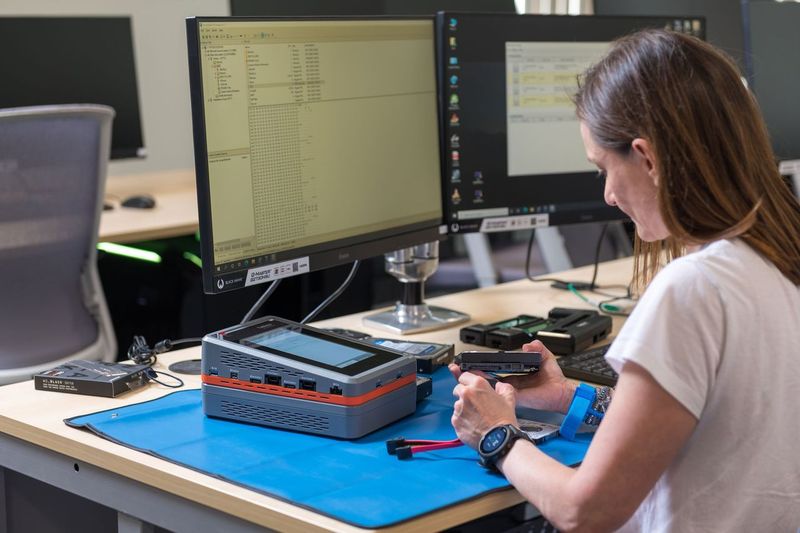As headlines around the world constantly underscore the evolving nature of global security challenges, Cranfield University’s School of Defence and Security continuously emerges with solutions — specifically in the form of providing graduates with the knowledge, skills, and real-world experience needed to address the pressing issues of our time.
Gabriela Boneva, a graduate from Bulgaria who developed an interest in forensics at the tender age of 13, is one of them. Her curiosity was intensified by early exposure to firearms and target shooting due to her parents’ occupation. International guest lecturers with expertise in forensic ballistics during her undergraduate studies in Greenwich further solidified her decision to pursue a Forensic Ballistics MSc at Cranfield University.
“The perfect blend of experts, one-of-a-kind facilities, and sense of community truly supported the statement that Cranfield is the place for further education in the Defence and Security domain,” she shares.
Reflecting on her time at Cranfield, Gabriela highlights two experiential learning opportunities that enhanced her understanding of forensic ballistics. The first involved acting as an expert witness in front of a mock court, presenting findings on a firearm investigation, and handling impromptu questions. The second, her individual research project on the “Effects of Grazing Ballistic Impacts on Combat Helmets and Behind Helmet Blunt Trauma,” gave her the confidence to work independently.
Beyond the technical expertise she gained through practical experience, Gabriela credits the programme’s diverse cohort for boosting her soft skills and expanding her network. “Communicating with a variety of people with different expertise and from different countries is at the root of my role as a researcher at Sheffield Hallam, and the MSc Forensic Ballistics helped me to seamlessly develop these skills whilst gaining field-specific knowledge,” she says.
As the official postgraduate academic provider to the UK’s Ministry of Defence (MoD), Cranfield’s School of Defence and Security advances existing careers just as effectively as it prepares students for their first professional steps. For example, Major Richard Robinson, a distinguished commander within the Jamaican Armed Forces had amassed over 14 years of military experience before joining Cranfield University.
His interest in the field deepened in 2021, following the assassination of the Haitian President. “I wanted a specific programme that would expose me to the theory of terrorism studies but more importantly, provide solutions,” he says. By pursuing a Counterterrorism MSc, he equipped himself for higher levels of responsibility to command specialised operational or training units. In fact, upon graduating, he was selected as a Course Facilitator at the Caribbean Institute of Professional Military Education.
The programme made him more reflective and critical of counterterrorism measures, policies, and strategies. Outside the classroom, Cranfield’s state-of-the-art facilities enhanced Richard’s learning experience, providing access to current and advanced technologies used in the Defence and Security industries. Access to MoD facilities at the Shrivenham campus broadened his perspective on developing effective counterterrorism strategies.

Cranfield Defence and Security provides specialist knowledge to global industry, security and emergency services, military, governments and NGOs. Source: Cranfield University
Indeed, Cranfield stands as a hub of cutting-edge facilities, continually expanding its resources to enhance academic and professional experiences. Recently, it inaugurated a new Crime Scene House facility at its Bedfordshire campus, coinciding with the 25th anniversary of the establishment of the Cranfield Forensic Institute.
The facility, designed to resemble an ordinary family home on the outside, houses various simulated crime scenes. The controlled setting aims to provide a practical environment for students, industry partners, researchers, and law enforcement professionals to enhance their investigation, evidence collection, and forensic analysis skills.
The Cranfield Ordnance Test and Evaluation Centre provides a unique environment beneficial to students. Specialising in the testing and evaluation of munitions, weapon systems, pyrotechnic and explosive stores, it also conducts disposals and demilitarisation.
Several programmes unlock access to such resources — one of which is the Explosives Ordnance Engineering MSc (EOE), which covers explosives engineering, munitions and target response while exploring the future of explosives development. Professor Tracey Temple has led the course for the last 11 years and plays a crucial role in keeping it both up-to-date and as experiential as can be.
Industrial visits and exposure to real scenarios, manufacturing techniques, safety procedures, and innovative projects, are integrated into the modules. Guest speakers, invited as lecturers, further enrich the programme’s practical dimension.
“EOE has many partnerships from the explosive industry from the UK and overseas and these include AWE, BAE systems, MBDA, Roxcel and the UK MoD,” says Professor Temple. “In addition, we have a great relationship with the Norwegian Ammunition Organisation who host us annually to tour their facilities.”
The Forensic Explosive and Explosion Investigation MSc is also informed by industry. “Explosion investigation methods taught in the programme are on par with those used in the national counterterrorism police post-blast course,” shares course director Mike Harris.
“Furthermore, practical research projects are tailored to address real-world and current issues — subjects for research are often provided by government, military, and police agencies.”
The theme of career-readiness persists throughout the rest of the School of Defence and Security’s academic lineup, which includes a Digital Forensics MSc, Forensic Biology MSc, Systems Engineering MSc, Information Capability Management MSc, and many more. Explore the full list of programmes.











